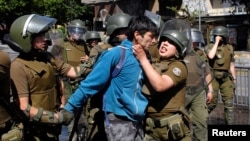A wave of social unrest across developing countries has left many investors unprepared.
The unrest is testing models designed to measure political risk for investors, causing some to withdraw their money from those countries.
That has led to worries that a withdrawal of billions of dollars of investments might itself worsen economic problems in some emerging markets. That could lead to even more anger in street protests as foreign money critical for economic growth and jobs disappears.
Anti-government protests in Hong Kong, Chile, Bolivia, Lebanon and other areas have proved as intense and durable as they were sudden and surprising.
The sharp reaction on financial markets has forced even experts on emerging markets to rethink their systems. These money managers usually are proud of how they have invested, but not this year.
Many work with specialists to watch everything from changes in taxation to social media to understand the threat of civil problems, rebellion or even war.
Risk measures
The unrest confirmed that traditional risk measures, like a country’s willingness to pay its debts, do not always show the early signs of disorder. Experts are turning to other measurements, such as internet freedom, or even the number of girls in school classrooms.
“It’s really about thinking where the next bit of unrest could occur,” said Richard House. He is the chief investment officer for emerging market debt at Allianz Global Investors. Any sign of “unrest in these markets and that has a big (effect) on asset prices,” he noted.
Prices for some stock shares and other investments have collapsed during the past 12 months. Lebanese government bonds now trade at less than half their value. The leading measure for Hong Kong’s stock prices has dropped around 13% since April. The value of Chile’s money, the peso, reached record lows.
The unrest in Chile came as a shock to investors. The country has enjoyed economic growth and rising wages for years. There were few if any warning signs when riots started in October.
With strong credit ratings, Chile was rated 18th out of 60 countries in BlackRock’s Sovereign Risk Index. The index measures things like debt levels and financial strength.
“This was a very solid country where institutions are very strong,” said Sergio Trigo Paz. He is head of emerging markets fixed income at BlackRock, the world’s largest asset manager.
One case study: Chile
Chile is different from other countries. Unrest is usually more likely in the “middle” nations, which have weak democracy or strongmen leaders, said James Lockhart Smith. He studies financial risk at Verisk Maplecroft.
Recently, Pembroke Emerging Markets cut its investments in Chile.
“One of the things we’ve learned is that things change (quickly) and when visibility becomes low, it’s better to take smaller positions,” said Pembroke’s chief information officer Sanjiv Bhatia.
Pembroke always considered the country’s level of risk when making investment decisions, he said.
“We’re avoiding places like Jordan and Oman,” which in many ways have populations similar to Lebanon and Iraq, said Allianz’s House.
BNP Paribas Asset Management has 436 billion euros in investments under management. It moved out of Bolivia and Venezuela before events worsened thanks to its own risk systems, said Bryan Carter, an expert in emerging markets.
“Can we imagine military dictatorships coming back in Latin America…that is completely unimaginable in a country like Chile, no way. But in Bolivia, I don’t know if I would say that so quickly,” he said.
It is not clear yet if the latest unrest has caused international investors to pull back completely. Chile saw $24.2 million of investors’ money leave the country in October, but some of it has returned.
The unrest has caused investors to watch countries with high levels of violence, discrimination against women, corruption or weak rule of law. These have all been among the concerns of protesters.
I'm Susan Shand.
The Reuters News Agency reported this story. Susan Shand adapted it for VOA Learning English. George Grow was the editor.
Write to us in the Comments Section or on our Facebook page.
____________________________________________________
Words in This Story
durable – adj. long-lasting
proud – adj. feeling deep satisfaction as a result of one’s qualities and/or possessions; pleased with
asset – n. an investment; a useful or valuable thing
bond – n. a promissory note in which a government or company offers to pay back an amount of money that it has borrowed and to pay interest for the borrowed money
institution – n. a large company or other group involved in financial trades
manager – n. someone responsible for controlling or supervising something
visibility – n. the ability to be seen





